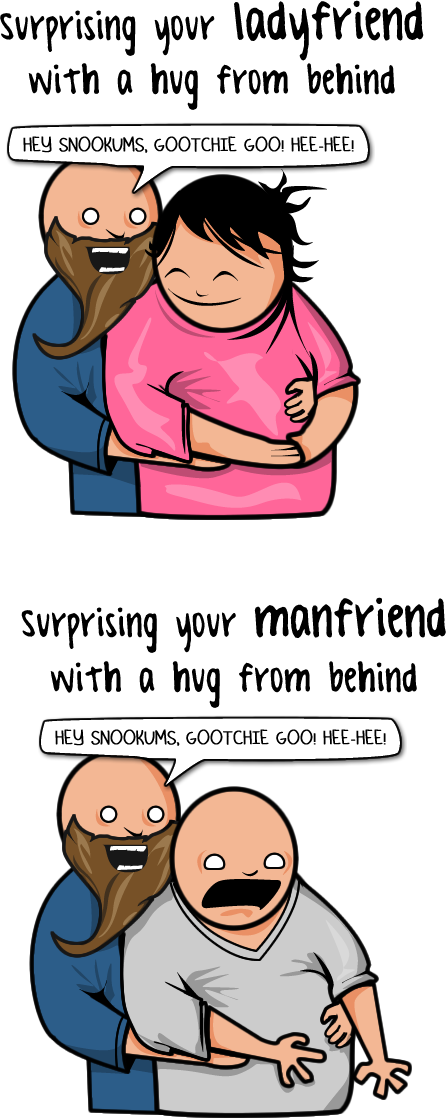[Trigger Warning for non-consensual touching]
Normally I enjoy reading the Oatmeal, but this recent comic is full of problems.

"Minor Differences: Part 2" In the first panel we se a man hugging his "ladyfriend." She responds warmly. In the second panel, we see a man hugging his "manfriend." The man responds in shock and horror.
So, first of all the joke of the comic obviously relies on homophobia and assumed heterosexuality for it to be funny. We are supposed to realize that no heterosexual man would approach another man in this way.
It assumes heterosexuality because I would wager that homosexual male couples do approach each other in this way, and get the reaction the “ladyfriend” is giving in this comic (the only person whom I would allow to hug me from behind is my partner).
But the comic is also an assertion of male power over women. One of the manifestations of power is being able to access others in a variety of ways. Marilyn Frye writes in the chapter “Some Reflections on Separatism and Power” from The Politics of Reality:
Differences of power are always manifested in asymmetrical access… Total power is unconditional access; total powerlessness is being unconditionally accessible. The creation and manipulation of power is constituted of the manipulation and control of access.
Frye provides a number of examples of how power allows differential access, and we can think about how different kinds of power grant different kinds of access. For example, in business environments bosses have access to employee emails and can track employee activity online whereas employees do not have similar access to their bosses’ use of the internet.
In this comic, we see that the man has access to a woman physically and he expects her to react in a welcoming manner. When he tries the same method of gaining access to a man, however, he does not expect a warm welcoming reaction. So the man expects to have access to his “ladyfriends” in a way he does not expect to have access to his “manfriends.”
This is actually really troubling. There are many reasons that a person might not want to be “surprised” with “a hug from behind.” For many rape or assault survivors this could be really triggering. Even for those who have not experienced an assault, but nevertheless fear one, it could also be traumatic. Furthermore, reaching around to hug someone from behind puts the onus on them to reject your advances rather than taking on the responsibility of seeking consent to the activity.





